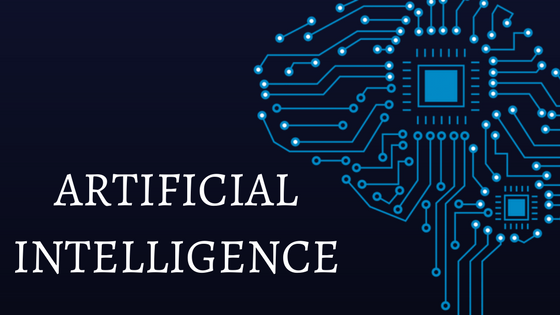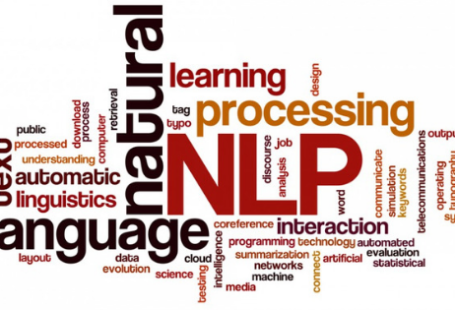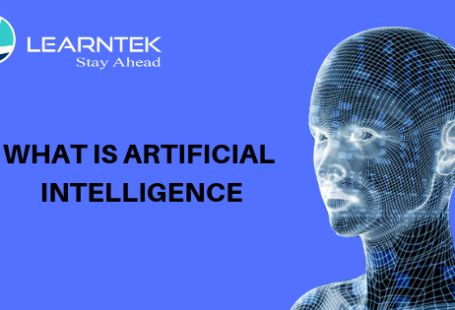Early machines were dumb and could only function according to a well-defined set of instructions. However, with the increasing power of the computers and processing networks, it is now possible to create and execute algorithms that can improve their functions with each iteration. This phenomenon is termed as artificial intelligence (AI), although it may be better termed as machine intelligence (MI).
Defining Artificial Intelligence(AI)
Artificial intelligence is difficult to define with complete clarity. A general definition may be presented as the ability of a machine to mimic functions that may be commonly associated with humans. This may include cognitive abilities, such as the ability to solve complex problems and learning from past experiences to improve in the future.
The scope of AI is expanding all the time. This is because intelligence is a subjective concept. There is a concept which defines artificial intelligence as the ability to perform machine functions which are currently not possible. Some important AI functions include automating vehicles, computer-based chess players, military simulations, routing delivery networks with efficiency, and recently, the ability to interpret information from large data sets.
We will now focus our attention on how artificial intelligence is a great way to improve data handling practices and ensure that we can learn more with the available data.
What is Data Processing?
Data processing is best defined as collecting different data items and then manipulating them in some form for producing the desired information elements. Data processing refers to changing data elements in a manner, where they can provide a higher functionality and the ability to offer complex results. Data processing is an important concept in modern firms, which can produce large data sets, more commonly referred to as big data.
Modern data processing started with the punched cards that Herman Hollerith prepared for the United States Census of 1890. It reduced the data processing time to two years, when it was common to wait eight years to prepare census results. Modern computers are far more capable and can now produce smart information for future use.
Data processing certainly benefits from the use of artificial intelligence, as it allows for obtaining more information from the available data sets, while ensuring that the errors are reduced and the probability of the approximations gets better with each data processing exercise. Now we describe some important benefits of using AI in data processing, especially when handling big data:
1.Improved Precision
An important benefit is the improved precision. Artificial intelligence algorithms can compare their current performance to the previous results and learn in order to improve the data processing. This results in improving the precision of your information elements. It is also possible to use big data solutions like Hadoop distributions and implement the power of AI to increase their functionality.
This allows companies to produce precise results from their data sets that they can swiftly implement in their business functions. You get improved performance and great value for money as a result. Artificial intelligence sets up improved data processing schemes and methods. It produces a method of continued improvement in the precision of the processed results.
2.Robust Solutions
Big Data processing is always associated with large data storage and the need for powerful processing. With the use of artificial intelligence in data processing systems, it is possible to reduce the number of steps in every process. This produces robust data solutions that are easy to implement and offer more organizational value.
Robust solutions are extremely valued in companies that depend on large data sets. The ability to produce swift responses gives businesses an important competitive edge. They can transfer this advantage to end users, ensuring that everyone benefits from the use of quick data processing solutions through the use of constantly improving AI algorithms.
3.The Convergence
The concept of using artificial intelligence is currently converging with the use of big data. This means that it is natural to expect that the two concepts when combined will always have more power than the sum of their individual advantages. It is important to use AI now with your big data solutions. This provides the basis for using integrated tools that are available from the top data software vendors, like Amazon, Cloudera, and Microsoft.
This convergence should be treated as an ideal benefit, since it allows businesses to decrease their total costs of business by improving efficiency and reducing the expenses of managing separate systems. Modern data solutions are including artificial intelligence through various tools and companies must compare and find a fit to improve their functionality in a consistent manner.
4.Convenient Levels
There are various levels of artificial intelligence that are available for use. This is important, because different data processing needs have different improvement requirements. You do not need a complex AI system, just to automate a simple processing task. However, when it comes to processing speech and achieve similar functionality, you need the highest AI performance that you can get.
This is an excellent benefit of AI that you can be selective in the level of cognitive functionality that you may require. Think of it as a human working on a concept, who will most often employ the most convenient solution when solving a cognitive problem. This is possible when you select responsible big data solutions that can scale their AI tools according to the data processing tasks that you require from the system.
5.Automating Routine Tasks
All businesses strive to improve their business functions. One way of achieving this is to automate the routine tasks that may take a lot of time, when performed by human resources. Artificial intelligence data tools can be employed to carry out routine tasks that are simply too boring for a person, when they must perform it on a daily basis.
Since the AI can take care of these time-consuming and mundane tasks, your human resources are free to work on the more creative concepts which the automation simply cannot cover. This is an excellent advantage for companies which often have to mix creative tasks with the handling of large data sets. Working out tasks separately for the human and the machine elements optimizes the efficiency of the business operations.
6.No “Errors”
It is impossible to avoid errors when human elements are employed in data processing. This may happen to many reasons. With artificial intelligence, the common mistakes with data handling are completely eliminated. However, computers can also produce bad results, but it will always be due to a programming error.
With the use of artificial intelligence, it is possible to continue to improve automated tasks and even detect an error in the programming of the data processing functions. AI certainly provides the benefit of always ensuring that you get reliable results, no matter the complexity or the sample size of the data sets that need processing.
7.Improved Security
Although this benefit is often hidden, artificial intelligence offers the benefit of improved security. This occurs because the data elements that are automated do not need to be processed by the human elements. This means that they can be often removed from a common data grid, which reduces the security risk present to an organization that employs data processing.
With faster data processing that you can carry out in an isolated manner, it is possible to then set up strong and complex security measures. Automated tools can easily work in such environments and allow your business resources to solely focus on achieving the organizational objectives.
These are a few important benefits that artificial intelligence offers, when dealing with data handling and processing. Big data firms can certainly improve their functionality and robustness if they implement AI in a systematic manner and produce clear advantages for their customers.






